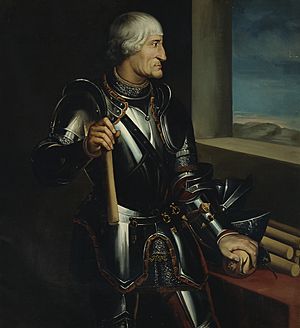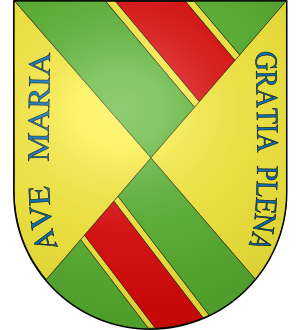Íñigo López de Mendoza y Quiñones facts for kids
Quick facts for kids
Íñigo López de Mendoza y Quiñones
|
|
|---|---|

Íñigo López de Mendoza, first marquis of Mondéjar by Francisco Díaz Carreño (Museo del Prado).
|
|
| Born |
Íñigo López de Mendoza y Quiñones
c. 1440 Guadalajara, Castile-La Mancha, Crown of Castile
|
| Died | 20 July 1515 (aged 74–75) Granada, Spain
|
| Nationality | Spanish / Castilian |
Íñigo López de Mendoza y Quiñones (born around 1440 – died July 20, 1515) was an important Spanish noble. He held the titles of the first Marqués de Mondéjar and the second Conde de Tendilla. People often called him El Gran Tendilla, which means "The Great Tendilla." He belonged to the powerful House of Mendoza family.
Íñigo was the son of Íñigo López de Mendoza y Figueroa, who was the first Conde de Tendilla. His grandfather was the famous poet Íñigo López de Mendoza, 1st Marquis of Santillana.
Contents
Early Life and Education
Íñigo was born in Guadalajara, Castile-La Mancha, which was part of the Crown of Castile at the time. He grew up in his grandfather's grand house. His brother, Diego Hurtado de Mendoza y Quiñones, who later became a cardinal (a high-ranking church official), also lived there.
Íñigo learned about politics and military strategies from his father. His father was an ambassador, meaning he represented his country to other leaders. Íñigo also learned from his uncle, Pedro González de Mendoza, who was a very influential cardinal.
Military and Diplomatic Career

In 1479, Íñigo became the Conde de Tendilla after his father passed away. The next year, in 1480, he went to the Royal Court in Toledo. There, he showed his loyalty to the Catholic Monarchs (King Ferdinand and Queen Isabella). He offered to help them in their war to conquer Granada.
Íñigo proved his great military skills during the Granada War. His nephew, Rodrigo Díaz de Vivar y Mendoza, 1st Marquis of Cenete, served under him. From 1484 to 1485, Íñigo was named the Alcaide (a military governor) of Alhama de Granada. He used his own money to defend these lands against the armies of Muley Hacén.
Ambassador to the Pope
In 1486, the Catholic Monarchs chose Íñigo to be their ambassador to Pope Innocent VIII. An ambassador represents their country to another leader or country. Íñigo had many important tasks to complete.
He worked to create a peace treaty between the Pope and the Kingdom of Naples. He also helped renew a special church order that supported a crusade. Íñigo also pushed for changes in the church and gave the king the power to choose bishops. He even convinced the Pope to recognize his uncle's children.
Pope Innocent VIII gave Íñigo a special sword as a gift. You can still see this sword today at the Museum of Lázaro Galdiano in Madrid. While in Rome, Íñigo became good friends with a scholar named Peter Martyr d'Anghiera. He later brought Peter Martyr to Spain to teach his own children.
Governor of Granada
In August 1487, Íñigo returned to fighting in the war against the Nazarí Kingdom of Granada. He was named the High Adelantado (a military commander) of Andalucía. He fought in many battles under the command of Gonzalo Fernández de Córdoba.
After Boabdil was defeated and Granada was conquered in 1492, King Ferdinand made Íñigo the Governor of the Alhambra and the Captain General of Granada.
As governor, Íñigo stopped the first uprising by the Moors (Muslims living in Spain) in Granada between 1500 and 1502. This uprising happened because Cardinal Francisco Jiménez de Cisneros forced many people to convert to Christianity. Íñigo later led troops against more uprisings in Alpujarras with King Ferdinand and Gonzalo Fernández de Córdoba.
After Queen Isabella I of Castile died in 1504, Íñigo remained loyal to King Ferdinand. He was one of the few nobles who did.
In September 1512, Íñigo received the title of Marqués de Mondéjar from Ferdinand II of Aragon. This title was later officially confirmed by Queen Juanna la Loca.
Family Life
Íñigo's first wife was Maria Lasso de la Vega y Mendoza. She brought part of the village of Mondéjar as her dowry (a gift of money or property given by the bride's family). Maria died in 1477, and they did not have any children.
Íñigo then married Francisca de Pacheco y Portocarrero. She was the daughter of Juan Pacheco, the first Marquis de Villena. Íñigo and Francisca had seven children together:
- María de Mendoza: Born in 1489, she married the Conde de Monteagudo in 1503.
- Luis Hurtado de Mendoza y Pacheco: He became the third Conde de Tendilla and was a friend and advisor to Charles V, Holy Roman Emperor.
- Antonio de Mendoza y Pacheco: He became the first Viceroy of New Spain and the second Viceroy of Perú. A Viceroy was like a governor who ruled a colony for the king.
- María Pacheco: She was the wife of Juan López de Padilla, a leader in the Revolt of the Comuneros.
- Bernardino de Mendoza y Pacheco: He was a Captain of the galleys (ships) in the Mediterranean Sea.
- Francisco de Mendoza y Pacheco: He became the Bishop of Jaén.
- Diego Hurtado de Mendoza: He was a poet, writer, and ambassador for Charles V, Holy Roman Emperor.
Death
Íñigo López de Mendoza y Quiñones died in Granada on July 20, 1515. He had given his final wishes a few days before his death.
See also
 In Spanish: Íñigo López de Mendoza y Quiñones para niños
In Spanish: Íñigo López de Mendoza y Quiñones para niños
 | Misty Copeland |
 | Raven Wilkinson |
 | Debra Austin |
 | Aesha Ash |

